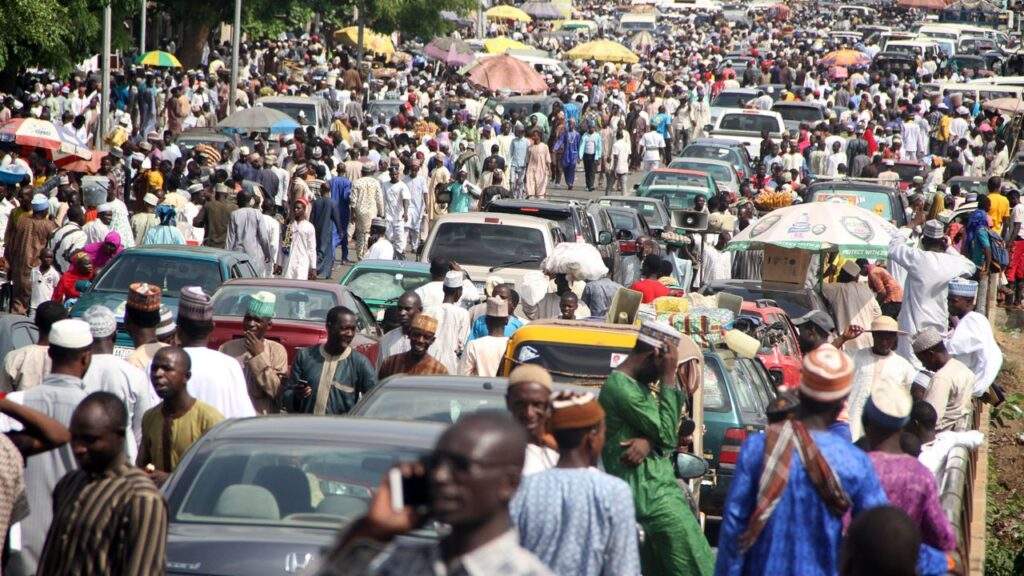The persistent economic turmoil in Nigeria has taken a heavy toll on its citizens, with inflation reaching unprecedented levels and pushing millions into poverty. In the past six months, the administration of President Bola Ahmed Tinubu has grappled with soaring hardship, currency devaluation, and heightened insecurity, leaving the nation teetering on the brink.
According to the National Bureau of Statistics, December 2023 saw inflation surge to 28.92%, marking the highest rate in 27 years. Of particular concern, food inflation spiked to 33.93%, significantly impacting the cost of living for ordinary Nigerians and eroding their purchasing power.
Despite President Tinubu’s calls for patience and resilience, the stark reality on the ground paints a different picture. Essential commodities such as rice, beans, groundnut oil, bread, and eggs have witnessed exorbitant price hikes, triggering outcry and desperation among the populace.
Umar Nasiru, a 46-year-old resident of Abuja, vocalized the sentiments of many, emphasizing that mere pleas for patience cannot assuage the dire economic hardships faced by Nigerians. The World Bank’s Nigeria Development Update report highlighted that accelerating inflation had propelled 24 million people into poverty within the first five months of 2023, further exacerbating the already grim situation.
The Central Bank of Nigeria responded to the crisis by raising interest rates to 18.75% and lifting restrictions on 43 items in a bid to alleviate pressure on the foreign exchange market. President Tinubu also outlined measures such as providing a monthly stipend and tax waivers for millions of Nigerians, aiming to alleviate the economic strain.
However, these interventions have provided little respite as Nigerians continue to grapple with the aftermath of fuel subsidy removal and Naira devaluation, coupled with a staggering national debt stock that soared to N87.91 trillion ($114.35 billion) in September 2023.
Amidst the suffering, the Nigerian government witnessed a surge in revenue, attributed to the fuel subsidy removal, leading to substantial gains in the federation account and a notable rebound for investors in the Nigerian Stock Exchange.
Renowned economist Prof Segun Ajibola characterized Nigeria’s inflation as a formidable adversary, emphasizing the need for a strategic, multi-faceted approach to effectively combat it. Ajibola underscored the necessity for policies targeted at addressing the root causes of inflation, cautioning against relying solely on short-term, demand-side measures.
Adding to the discourse, Prof Godwin Oyedokun of Lead City University proposed eight immediate interventions to mitigate the escalating cost of goods and services, stressing the urgency for government intervention and price controls on essential commodities.
As Nigeria grapples with the daunting economic challenges under President Tinubu’s leadership, the path to recovery demands a concerted and holistic strategy—grounded in a deep understanding of the underlying dynamics of inflation and a resolute commitment to implementing sustainable solutions.
Unraveling Nigeria’s Inflation Woes: A Path to Economic Stability
Nigeria, like many countries, grapples with rising inflation, posing significant challenges for its citizens and economy. As prices surge, consumers face the burden of increased living costs, impacting their purchasing power and overall quality of life. A closer look reveals the complex interplay of factors triggering this inflationary surge and unveils potential solutions to steer the nation towards economic stability and affordability.
At the heart of Nigeria’s battle with inflation lies the removal of fuel subsidies and the Naira floating policies under the Tinubu administration. This move, as observed by Mr. Idakolo Gbolade, CEO of SD & D Capital Management, triggered a surge in inflation, with the country experiencing its highest rate in 27 years during 2023. Gbolade points to the pivotal role of these policies in exacerbating inflation, emphasizing the urgency of implementing measures to alleviate their impact.
However, amidst these challenges, a glimmer of hope emerges through proposed government policies. The declaration of a state of emergency on agriculture, coupled with the promise of single-digit interest loans to companies and SMEs, signifies a proactive approach to addressing the root causes of inflation. Furthermore, the commitment to fostering an investment-friendly climate holds promise for ushering in a new era of economic resilience.
Crucially, the impending establishment of the Dangote and Port Harcourt refineries stands as a potential game-changer. These refineries are poised to bolster the retention of US dollars within the system, offering a beacon of stability that could strengthen the Naira and alleviate the scarcity of this crucial foreign currency. Gbolade’s projections for a slowdown in inflation by the middle of 2024 hinge on the effective implementation of these transformative policies.
Amidst these policy discussions, a spectrum of potential solutions emerges, each holding the potential to recalibrate Nigeria’s economic landscape. From revitalizing the agricultural sector to fortifying social safety nets and enhancing infrastructure, multifaceted strategies come to light. Encouraging competition within industries and fostering access to credit for businesses, especially SMEs, represent paramount avenues to curb inflation and cultivate sustainable economic growth.
Nevertheless, the road to economic stability demands a comprehensive, cooperative effort. Nigeria’s journey to quell inflation and foster affordability necessitates a blend of short-term interventions and enduring strategies. It calls for unity across multiple stakeholders, encompassing the government, private sector, and civil society, to chart a resilient course toward a stable and prosperous economy.
As Nigeria stands at the crossroads of economic transformation, the choices made today will reverberate far into the future. The resolve to implement and sustain these measures will define the nation’s capacity to surmount the inflationary tide and forge a future where prosperity and affordability walk hand in hand.
